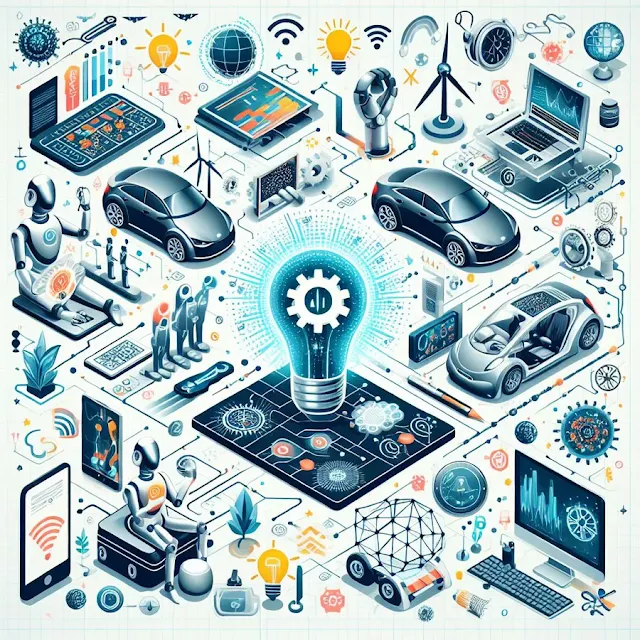AI in Robotics: From Self-Driving Cars to Smart Homes
Introduction
The Rise of AI in Robotics
Understanding AI in Robotics
Evolution of Robotics
AI in Self-Driving Cars
How AI Powers Autonomous Vehicles
Impact on Transportation and Safety
AI in Smart Homes
Transforming Living Spaces
Enhancing Security and Efficiency
Challenges and Ethical Considerations
The Dilemma of Autonomy
Data Privacy Concerns
Future Trends in AI and Robotics
Integrating AI into Everyday Life
Potential Innovations on the Horizon
Conclusion
Introduction
Artificial Intelligence (AI) has become a ubiquitous force in our rapidly advancing technological landscape, revolutionizing various industries. In this blog, we explore the profound impact of AI on robotics, particularly in the realms of self-driving cars and smart homes. As we delve into these innovations, the synergy between AI and robotics becomes increasingly evident.
The Rise of AI in Robotics
Understanding AI in Robotics
AI in robotics refers to the integration of artificial intelligence technologies into robotic systems, enabling them to perform tasks that traditionally require human intelligence. This amalgamation has given rise to a new era of automation, where machines can perceive, learn, and adapt to their surroundings.
Evolution of Robotics
The evolution of robotics has been marked by significant milestones. From basic automated systems to sophisticated machines with cognitive capabilities, the journey has been transformative. AI plays a pivotal role in this evolution, allowing robots to navigate complex environments, process information, and make decisions autonomously.
AI in Self-Driving Cars
How AI Powers Autonomous Vehicles
The automotive industry is undergoing a paradigm shift with the advent of self-driving cars. AI algorithms, fueled by vast datasets and machine learning models, enable these vehicles to interpret real-time traffic conditions, make split-second decisions, and navigate routes with unparalleled precision. The incorporation of AI has elevated autonomous driving from a distant dream to a tangible reality.
Impact on Transportation and Safety
The impact of AI in self-driving cars extends beyond convenience. These vehicles hold the promise of reducing traffic accidents and congestion, enhancing overall road safety. The ability of AI to analyze and respond to dynamic driving conditions surpasses human capabilities, creating a safer and more efficient transportation landscape.
AI in Smart Homes
Transforming Living Spaces
The concept of smart homes revolves around the integration of AI-driven technologies to enhance the quality of life within residential spaces. AI-powered devices, from smart thermostats to voice-activated assistants, create an interconnected ecosystem that adapts to the preferences and needs of residents. The seamless integration of AI into smart homes transforms mere living spaces into intelligent, responsive environments.
Enhancing Security and Efficiency
AI reinforces the security infrastructure of smart homes by enabling advanced surveillance systems and facial recognition technologies. Moreover, smart home devices, empowered by AI, optimize energy consumption, contributing to environmental sustainability. The efficiency gains in managing resources not only benefit homeowners but also contribute to a more sustainable future.
Challenges and Ethical Considerations
The Dilemma of Autonomy
As AI systems gain autonomy, ethical considerations come to the forefront. The question of responsibility in the event of system failure or error poses a significant challenge. Striking the right balance between AI autonomy and human oversight remains a critical aspect of the ongoing dialogue surrounding the integration of AI in robotics.
Data Privacy Concerns
In the era of interconnected devices, data privacy emerges as a paramount concern. The constant exchange of information between AI-driven devices raises questions about the security of personal data. Stricter regulations and ethical frameworks are essential to address these concerns and ensure the responsible use of AI in robotics.
Future Trends in AI and Robotics
Integrating AI into Everyday Life
The future holds exciting possibilities as AI continues to weave into the fabric of everyday life. From healthcare to education, the integration of AI in various sectors promises advancements that were once thought to be confined to the realms of science fiction. The ongoing research and development in AI and robotics suggest a future where these technologies seamlessly integrate into our daily routines.
Potential Innovations on the Horizon
The convergence of AI and robotics is poised to bring forth innovations that can redefine industries. From AI-powered robotic assistants in healthcare to autonomous delivery drones, the possibilities are vast. The continual exploration of new applications and the refinement of existing technologies are crucial in unlocking the full potential of AI in robotics.
Conclusion
In conclusion, the marriage of AI and robotics is reshaping the way we interact with technology. From the autonomous revolution in transportation to the intelligent ecosystems of smart homes, the influence of AI is profound. As we navigate the challenges and ethical considerations, the future promises a landscape where AI seamlessly integrates into our daily lives, enhancing efficiency, safety, and overall well-being. The journey from self-driving cars to smart homes is just the beginning of a transformative era powered by the synergy of AI and robotics.
